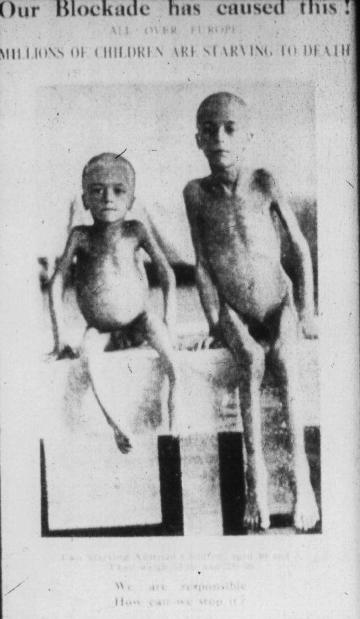
British World War I Humanitarian Effort: Individul Charities -- Save the Children

Figure 1.-- This is the leaflet that Eglantyne Jebb passed out in Trafalgure Square (1919). There was enormous bitterness in Bitternes in Britain toward the Germans after the War. Jebb was arrested and tried. The result of this was the founding of Save the Children. Chapters were founded in Britain, many European countries, nd the United States. They have contributed to efforts saving libes througjout the subsequent 20th century and continue to do so today. The British, American, and Swedish chapters have been particularly active. /i>
|
|
A British woman, Eglantyne Jebb, founded Save the Children after the War to assist the children adversely affected by the war (1919). Eglantyne was born in Ellesmere, Shropshire (1876). Her family was well to do and Eglatyne and her sisters grew up in comfortable circumstances in rural England. The Jebbs had a strong social conscience and were commited to public service. Their mother, Eglantyne Louisa Jebb, founded the Home Arts and Industries Association, to promote Arts and Crafts among rural youth. Eglantyne' sister Louisa would help found the World War I Women's Land Army. Another sister, Dorothy Frances Jebb, married the Labour MP Charles Roden Buxton, and argued against the demonisation of the German people after the War. Eglantyne' concern was primarily the children in war ravaged Central Europe where war time food shortages were resulting in famine conditions. It would be some time before the agricultural sector could ve returned to normal. An early effort was to feed Austrian children many of whom were threatened by post-War famine conditions. People were beginning to starve and children were the most vulnerable. Such was the animosity toward Germany and Austria-Hungary after the War, the core of the Central Powers, Jebb was criticized for assisting 'the enemy'. Eglantyne bravely began handing out leaflets in the heart of London-- Trafalgar Square. The leaflets had a shocking photo of two emaciated children. The headline read: ‘Our Blockade has caused this – millions of children are starving to death’. Eglantyne was arrested and put on trial for her protest. We are not surevjust what law was being violated, apparently some kind of war time censoeship still in effect. She was found guilty, but the judge was so impressed with her that he actually offered to pay her fine. It proved to be the first donation to the charity she went on to found -- Save the Children. Eglantyne became known as the 'White Flame' because the flame of her commitment and love of children in distress burned to a white heat of passion all her life. Save the Children remains one of the biggest humanitarian legacies of the Great War. Chapters were founded not only in Britain, but in countries America and Sweden that would make important humanitarian efforts in the 20th century and continues to do so in the 21st century.
CIH -- WW I

Navigate the CIH World War I Section:
[Return to the Main Save the Children page]
[Return to the Main English World War I charities page]
[Return to the Main English home front page]
[About Us]
[Aftermath]
[Alliances]
[Animals]
[Armistace]
[Biographies]
[Causes]
[Campaigns]
[Casualties]
[Children]
[Countries]
[Declaration of war]
[Deciding factors]
-------[Diplomacy]
[Economics]
-------[Geo-political crisis]
[Home front]
[Intelligence]
[Military forces]
[Neutrality]
[Pacifism]
[People]
[Peace treaties]
[Propaganda]
[POWs]
[Russian Revolution]
[Terrorism]
[Trench warfare]
------[Technology]
[Weaponry]
[Bibliographies]
[Contributions]
[FAQs]
[Images]
[Links]
[Registration]
[Tools]
[Return to Main World War I page]
[Return to Main war essay page]
[Return to CIH Home page]
Navigate the Historic Boys' Clothing Web chronological pages:
[The 1840s]
[The 1900s]
[The 1930s]
[The 1940s]
[The 1950s]
[The 1960s]
[The 1970s]
[The 1980s]
[The 1990s]
Created: 1:01 AM 1/14/2017
Last updated: 1:01 AM 1/14/2017



